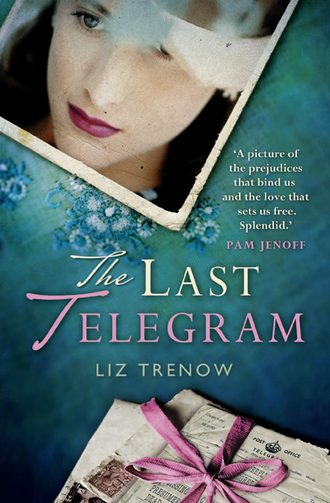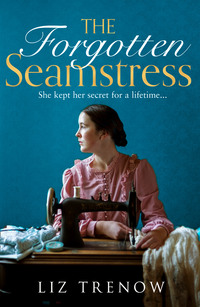
Полная версия
The Last Telegram
As we came closer we could see a gang of older boys kicking a football around on a patch of worn grass, and other children huddled against a chill wind on benches outside one of the pastel-painted chalets. Their faces were solemn and pale, like rows of white moons, turning to watch our van.
Pinned to each child’s coat was a label. ‘Like little parcels,’ I said. John nodded, grim-faced.
We stopped and climbed out and the boys left their football game and ran over, crowding round us, firing questions in their strange guttural tongue. They stopped in surprise when John started speaking in fluent German, and when he’d finished they began chattering even more excitedly than before.
‘Don’t worry,’ he said to me. ‘They’re only asking who we are and why we are here. They want to know where we’re from and if we can help. What they mostly seem to want to know is if we can take them to Piccadilly Circus,’ he laughed. ‘They’re desperate for a bit of the high life, and who can blame them?’
At last an adult appeared, pushing his way through the gaggle. He was short, prematurely balding and scruffily dressed in workmen’s jeans and a thick jacket, so different from the crisply intimidating holiday camp staff of my childhood memory. I warmed to him immediately.
‘You must be John and Lily Verner? Welcome to Sunnyside. Name’s a bit ironic on a day like today, don’t you think? I’m Leo Samuels. They call me duty manager, though that’s just a posh title for chief muggins.’ He beamed as we shook hands. ‘Now, what can we do for you, or rather, what can you do for us? Come into the office and let’s keep warm while we talk.’ To the boys he said, ‘Geduldig Sein, be patient.’ As we walked he apologised for the way they had pestered us. ‘You understand, they’ve been through terrible times, and being out here in the wilds of Essex isn’t helping. They need to get settled as soon as possible.’
One of the larger chalets at the end of a row had a hastily-painted sign: Kindertransport All Enquiries. Up two steps, a wooden balcony led through glazed double doors into a small living area next to a kitchenette, with what must have been bedrooms on either side. Leo gestured to a table covered in a chaos of papers and dirty mugs, and went to fill the kettle. ‘Do sit down. Tea or coffee? How do you take it?’
He chattered cheerfully as he rinsed out three mugs in a cluttered basin, waiting for the kettle to boil. ‘Sorry for the mess, but we’re on a shoestring here,’ he said, pushing aside untidy piles of papers and boxes on the table to make space for the tray.
‘We’re all volunteers and it’s a bit hand-to-mouth, to say the least. Of course we’re dead lucky they’ve let us have this place for free. You probably know that the boss is Jewish, that always helps. Otherwise we’re totally dependent on charity and right now people have other things on their minds than helping a bunch of German children.’
He sighed. ‘We’re doing what we can for the poor little blighters. Most have sponsors, but this lot have been let down for one reason or another. So not only have they been through some terrible things and been sent away by their parents, but when they get here no one wants them. It’s ruddy awful, if you’ll excuse my French, Miss Verner.’
I cradled my cold fingers round the hot mug, struggling to imagine what it must feel like for these children, being so doubly rejected. No words, even coarse words, could come close to describing it.
‘I was in Austria last year,’ John said, ‘and I saw what was happening.’
Leo shook his head sadly. ‘It’s so much worse, now.’
‘I was afraid it would be,’ John said. ‘So when we heard about your work we had to do something.’
‘It is very good of you,’ Leo said simply, and took a sip of his coffee. ‘So, how do you think you can you help us?’
‘Our family runs a silk mill, in Westbury. Do you know it? About thirty miles from here,’ John started.
‘Silk, eh? How interesting,’ Leo said, listening intently.
‘We’d like to take on three new apprentices,’ John went on. ‘And we wondered if you had some older boys, sixteen, seventeen maybe. Preferably bright lads, who’d be capable of learning a skilled trade.’
‘They’ve got to be mature and sensible types too,’ I added. ‘They’ll be living in a rented house and will have to learn to look after themselves.’
Leo sat back, scratching the sparse hairs on his head. ‘This is music to my ears, you know. Most people want younger ones, especially girls. They think the little ’uns are less trouble, though I’m not sure they’re right. The older boys get overlooked and it’s usually hard to place them.’
He thought for a moment and then said, ‘Okay. I’ve got three in mind. First there’s Stefan. He’s obviously older than most of them. Between you and me I think he’s over eighteen, the official limit. But his papers say he’s seventeen and who are we to challenge it? He’s obviously been through quite enough already without us interfering, poor lad. Don’t know much about his background but he’s clearly very bright.’
‘Sounds just right,’ I said.
Leo went on, ‘Stefan’s friendly with a couple of brothers, Kurt and Walter. Also nice lads. Kurt’s seventeen but Walter’s only fifteen. Is that too young?’
‘Depends on the boy,’ John said doubtfully. ‘How mature he is.’
‘Hard to tell, to be honest with you,’ Leo said. ‘But we obviously can’t separate them and it’s been almost impossible to find a double placement. Walter’s just a little lad, but I reckon he’d soon shape up, especially with his brother Kurt looking after him. He’s a pretty mature, level-headed boy. Why don’t you meet them, see what you think?’
How could we refuse?
‘Good,’ said Leo, getting up. ‘I’ll get those three in here, explain what you’re offering and we can see if they like the idea.’ Halfway out of the door he turned back. ‘All the lads are keen to see the bright lights of London, so you may have persuade them Westbury’s a good option. Not too far to the city by train, is it?’
As they came into the chalet I recognised the three boys as part of the football gang, but they were much more subdued than before. Leo introduced them: ‘Stefan, Kurt, Walter, dies ist John Verner und seine schwester Lily.’ They shook hands politely, barely meeting our eyes. They seemed so different from English boys. Was it just the language barrier, or the way they looked – the pallor of their faces, the unfashionable haircuts, underfed frames and curious cut of their clothing? I found it impossible to fathom what was going on inside their heads.
As John started to talk they exchanged glances, their faces becoming more animated, even excited. When he finished, the boys started talking between themselves, words falling over each other, interrupting each other, all at once.
Stefan certainly seemed older than seventeen. He was skinny and taller than the others, dressed in a scruffy brown leather jacket and black trousers. He hadn’t shaved for a couple of days and a dark shadow grew thickly on his slim face. His voice was more baritone than tenor and deep-set eyes peered out warily through his floppy fringe of untidy hair.
Kurt and Walter were very alike; in their tweed trousers, hand-knitted jumpers and woollen waistcoats they reminded me of the farm boys who came into Westbury on market days. Wiry kinks of mousy hair sprouted from their heads but their boyish cheeks showed little hint of growth. Kurt was chatty and confident, and Walter tended to repeat what his big brother said. Both of them appeared to defer to Stefan as their leader, turning to him if John or Leo said something they didn’t understand.
Trying to gauge their personalities as they talked, I wondered how these boys would cope with the robust camaraderie among the men at the mill.
‘They’re all pretty keen,’ John said, eventually turning to me. ‘They’re especially excited by the idea of earning their own money, and sharing a house.’ He laughed. ‘Though goodness knows whether they can cook and clean for themselves. What do you think?’
‘We can worry about the housekeeping thing later. But can they learn quickly enough to be useful at the mill?’ I said, recalling Father’s strict instructions.
‘Heaven knows.’ John shrugged his shoulders. ‘Only time will tell, I suppose.’
‘If they’re all good friends, perhaps they will support each other?’
He nodded, but his expression was still doubtful.
‘One thing’s clear. We can’t leave them here,’ I said, suddenly flooded with certainty, more convinced that this was the right decision than at any other time in my life. I wanted these boys to feel safe and be loved. I could not contemplate leaving them here.
‘Let’s go for it,’ we both said at the same time, and then laughed at ourselves.
This time the handshakes were stronger and their smiles much more confident. There was formal paperwork to complete and signatures to be written and witnessed, then they collected their pitifully small suitcases before finally saying goodbye to Leo, promising to keep in touch and piling into the van. As we drove away they waved to their friends, then fell silent.
They must be glad to leave this grim place, I thought, but it is their last link with home. They’ve suffered terribly and now they have no option but to follow the Pied Piper – two strangers in a battered old van – into an unknown future.
Over the next few days the German boys stayed at The Chestnuts and we spent time getting to know them. The fear started to leave their faces, their frames seemed to fill out and they gained confidence, trying out English phrases as we struggled to get our tongues around their strange German words.
We traipsed around Westbury finding kitchen equipment, bedding, rugs and curtains to make their cottage more homely. On the day they moved in, Mother and I pinned labels to everything around the house and led the boys through each room, saying the words. She made cartoon sketches of every item on their shopping list, and they took turns to ask the grocer and greengrocer for their purchases, laughing at each other’s attempts, and gradually beginning to relax.
John took them to the tailors, buying each of them a couple of pairs of off-the-shelf trousers for smart and casual, a couple of shirts, fashionable Fair Isle jumpers and navy blazers for weekends. On Saturday they went with him to watch a local football match. Kurt and Walter were keen to play, and he promised to find a team for them.
But now it was time for them to earn their keep. John and Jim Williams took them on a tour of the mill, then talked to them individually about the jobs we had planned for them. Walter and Kurt – still inseparable – would start as packers. Stefan was keen to be a weaver and Gwen agreed to take him as her new apprentice. It was a compliment, she told me, though it was barely recognisable as such. ‘I reckon you can just about manage two looms on your own now, Lily,’ was all she said. ‘So I can concentrate on helping Stefan’.
I couldn’t help smiling, watching them together on that first day. They made a curious pair – Gwen, short and dumpy, doing her best to communicate through hand gestures over the noise of the looms, or standing on tiptoe to shout into his ear; Stefan bending like a weeping willow over the loom, his fringe flopping in his eyes. She mimicked the way he constantly brushed the hair back from his forehead, offered him her flowery headscarf and made him laugh. His eyes followed her face intently, struggling to lip-read in a foreign language.
‘That boy’s a fast learner,’ she said at the end of that first week. We were doing the Friday evening loom checks together, covering woven cloth and warps with dust sheets, ensuring that shuttle arms were securely docked, winding up loose threads and tucking away spare spools, turning off the power at each machine. Making everything safe for the weekend.
‘He’s got real aptitude,’ she added. I could hear the warmth in her voice and even as I knew she was right – he already understood the elegant mechanics of the loom, how to balance the weights and tensions, and was deftly locating and retying lost warp threads – I felt a pinch of envy. She’d never praised me like that, not to my face at least.
‘You’d better watch out. He’ll soon be teaching you,’ I laughed, trying to conceal my annoyance.
‘I look forward to it. He’s a very polite, charming young man. Deeper than the other two. Has an artistic touch. What do you think?’
‘You’d know better than me,’ I said, niggled she’d found something else to admire. ‘With that art school background you said you’d tell me about.’
‘You should come for tea some time, then maybe I will.’
‘So you keep promising,’ I said. I’d dropped so many hints over the past weeks, with no response, that I was starting to wonder why she was so reluctant. Did she just not like me enough to invite me into her personal life? Or was there something else, something she didn’t want to reveal? Gwen was such an enigma.
As we finished our rounds and parted at the front door she touched me lightly on the shoulder, elusive as ever. ‘Enjoy your weekend.’
Once the boys had moved into the cottage, we invited them to join us for lunch at The Chestnuts every Sunday.
‘Help them learn proper manners. They’ll turn into savages in no time, living on their own,’ Father said. ‘We need to civilise them.’ Mother enjoyed sharing her pleasure in English cooking, and it was usually a roast with all the trimmings that they appeared to relish.
Though homesickness still showed in their faces, Kurt and Walter were like other teenage boys – gawky, clumsy, fascinated by football and motorbikes. They struggled with English table etiquette, muddling their cutlery, slurping their drinks, leaning elbows on the table. At first, Father was lenient but after a few weeks he’d bark stern reminders: ‘No talking with your mouth full.’ They were slow to learn, and more than once he had to threaten them, ‘If you don’t take those elbows off the table at once, there will be no more lunch for you.’ Walter giggled and Kurt – always the rebellious one – grimaced, but their hungry stomachs forced them into reluctant compliance.
Stefan needed no such prompting. His manners were already sophisticated and what he didn’t already know of English etiquette he quickly picked up by watching. Now that he had abandoned the old leather jacket and black trousers for the cords, jumpers and jacket John had bought him, he looked almost like an English boy, apart from the hairstyle he insisted on keeping unfashionably long. But he was unlike any other boy I knew.
What I had mistaken for shyness, I slowly began to realise, was actually a confident stillness. While the others always needed to be active, Stefan seemed content to observe the world around him quietly, with an expression of mild curiosity and, I sensed, amusement simmering just below the surface. Little escapes those eyes, I thought, with a slight shiver.
That Sunday, Stefan handed back my copy of The Hound of the Baskervilles with one of his rare smiles.
‘I enjoy very much, Miss Lily,’ he said, his dark eyes sparkling. ‘I would like to be a perfect English gentleman like your Sherlock Holmes.’ He raised an imaginary bowler hat, pretended to twirl an umbrella and bowed deeply, making me laugh out loud. Stefan the clown was a side of his character he hadn’t revealed till now.
In just two months his English improved so much I’d abandoned my intention to speak German. I was astonished by how quickly he learned; he could already read in another language. This was the second Conan Doyle book I’d lent him, and every time he visited he devoured Father’s copy of The Times, urgently looking for news from Europe.
Over lunch, we encouraged them to talk about home. Of course, we got only the edited versions. Stefan told us about his parents, both schoolteachers in Hamburg, and his younger twin sisters. He hoped they would come to England once they’d saved or borrowed the money for permissions and transport. Kurt and Walter spoke longingly of the Bavarian hills and the family farm. The English countryside is so flat, they complained. As conversation flowed, I reflected with satisfaction that the boys were starting to feel more secure.
It was our usual custom to follow lunch with a walk on the water meadows, but that day it was pouring. ‘Not a good day for a walk,’ Father said, looking out of the drawing room window, ‘it’s raining cats and dogs.’
‘Cats and dogs?’ Walter said, frowning. ‘Why do you say cats and dogs?’ he asked, after we’d told him what it meant. We had no idea. Some English phrases were so hard to explain.
After coffee, Father suggested a game of cards. But I had a better idea.
‘What about a song, Mother?’ I said, pointing to the baby grand. It was rarely played these days, and generally served as a shelf for photographs and ornaments.
‘I couldn’t,’ she said, blushing and nervously smoothing her skirt, ‘haven’t played for years.’ She’d had a classical training and, though never a professional performer, she’d given piano lessons and played in local amateur concerts before marriage and children got in the way. When times at the mill had been hard and there was no extra cash for servants, her music had been sacrificed to housework and cooking.
‘Come on, you can do it,’ I said, going over to the piano stool and rifling through the piles of sheet music stored under its padded lid. I found what I was looking for; a score, now dog-eared and falling apart at the seams, Music Hall Favourites.
‘Here we are,’ I said. I moved the knick-knacks from the piano, propped it open, lifted out the music shelf, took her elbow and led her to the piano stool. ‘Now all you have to do is play.’
‘It’s been so long.’ She shook her head. ‘My fingers won’t know what to do.’
It was Stefan who finally persuaded her. He was sitting on the arm of the sofa, leaning forward, watching intently. ‘Please, Mrs Verner. Please play for us,’ he said. ‘We like very much to hear the piano.’
As she started, everyone began to listen. Watching her fingers move over the keys with growing confidence, I remembered how she used to sit me on her knee as she played. With a child’s selfishness it seemed then that her music was just for me. Now, hearing her again after so long, I realised what a sacrifice she had made, giving up her music to meet the demands of the family.
She stopped to look through the battered old score. ‘Here’s a good one. My Old Man Said Follow the Van.’ As she started into the familiar tune, John and I got up and stood beside her, reading the words over her shoulder. After a couple of verses the boys came to join us, starting to hum along and sing the chorus with us.
When we sang the words ‘dillied and dallied, dallied and dillied’, they started to giggle. ‘What is “dilly dally”, please?’ Walter asked. I struggled to find a polite explanation.
‘It means they spent a lot of time hanging around drinking, or talking, or …’
John interrupted, saying something in German, and they guffawed like schoolboys. Next time we repeated the chorus they made cheeky kissing noises and Father frowned in gentle reproach.
After three more numbers Mother declared she’d reached the end of her repertoire and went to make tea. As the others drifted back to the warmth of the fire, Stefan stayed by piano, apparently lost in his own thoughts. Then he seemed to settle something in his mind and looked at me briefly with a slight smile before pulling out the stool and sitting down, tentatively spreading his hands over the keys. Something tugged in my heart as I noticed for the first time the perfect pink ovals of his nails at the end of each long, elegant finger.
He played a few scales and then, haltingly, started to pick out a tune I recognized as the opening bars of the Moonlight Sonata. Muttering at his mistakes and pausing to remember each following phrase, Stefan stumbled on, but his arpeggios sounded more like a doleful trudge than the calm moonlit landscape Beethoven had intended.
After a few minutes, he took his hands from the piano and sighed, lowering his head. The untrimmed wisps of dark hair curled down his neck and over his collar, and I felt a surge of sadness for this strange boy, so far from home.
‘Play us the jazz,’ Kurt said.
Stefan looked up at me.
‘This is okay for you?’ he asked. ‘You like the jazz?’
‘Very much,’ I said, smiling encouragement.
Stefan turned back to the keyboard, took a deep breath, and launched into an exuberant ragtime piece. The solemn struggle with Beethoven was transformed into the joyful freedom of jazz. The fingers on Stefan’s right hand moved so fast they became a blur as the left hand stretched into successions of complex chord sequences.
Everyone in the room started to move; heads nodding, feet tapping, even Father’s knee was jiggling. The rhythm was irresistible.
‘Remember those Swing steps, Lily?’ John leapt up and took my hand as we clumsily tried to approximate the dance we’d learned on New Year’s Eve. Kurt and Walter watched for a moment and then came to join us, doing their own wild version, waving arms and legs around without any regard for the rhythm.
From the piano, Stefan shouted, ‘Swingjugend, swing. Swing heil!’ Kurt and Walter raised their arms in mock-Nazi salutes and repeated ‘Swing heil! Swing heil!’
Mother’s eyebrows raised in alarm.
‘What that all about?’ I shouted to Kurt.
‘American jazz. Banned by the Nazis,’ Kurt shouted back.
‘Why is it banned?’
He shrugged. ‘Stefan plays it for – what do you say?’
Stefan stopped playing and swivelled round. In the sudden stillness his voice was firm and clear, ‘We play it because it is not allowed.’
‘Who’s we, Stefan?’ John asked.
‘Swingjugend.’
‘Until they were arrested,’ Kurt said, almost under his breath.
‘“Arrested”?’ I repeated, failing for a moment to understand the full import of the word.
Stefan glowered at him. ‘They just gave us a beating. As a warning.’
It was such a shocking image none of us knew what to say next. My mind whirled, trying to understand. How could the police – or was it soldiers? – be so violent against young boys, just for playing music? The sense of menace seemed to seep into the room like a poison.
Mother spoke carefully, ‘Are you saying that the police beat you and put you in prison, Stefan?’
Stefan nodded. ‘The SS,’ he said. ‘But we were not in prison for long. It was just a warning.’ He paused and then went on, ‘That is why I had to leave Germany.’
‘You poor boy,’ she murmured. ‘No wonder …’
‘Were you all members … of this group?’ I stuttered.
‘Only Stefan,’ Kurt said. ‘We do not know about it till he tell us.’
‘There is no Jugend where we live,’ Walter added.
‘Perhaps we make our own group, here in Westbury?’ Kurt smiled, and the tension in the room started to settle. ‘Can he play some more?’
Stefan looked at Father, who nodded.
This time we listened quietly. It didn’t seem right to dance. Trying to make sense of what the boys had told us, I began to understand why this music was so important for Stefan. The baby grand had never known such spirited, emphatic playing. It was an act of protest and defiance, seeming to drive the menace out of the room.
After a few minutes he stopped, and we all applauded and cheered. As Stefan straightened up from a mock-formal bow, I saw for the first time his face fully illuminated with happiness.
Chapter Six
Finishing is the final procedure in the long and complex process of transforming the silkworm’s gossamer into a perfect piece of woven silk. Dependent on the type of fabric required, finishing can include dyeing, boiling, tentering, drying and pressing in a variety of ways to achieve an extraordinary range of characteristics: firmness, fullness, dullness, lustre, softness or draping quality. For certain technical applications, such as parachute silk, finishing is critical in determining the final porosity of the fabric.






